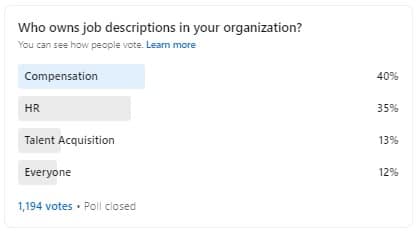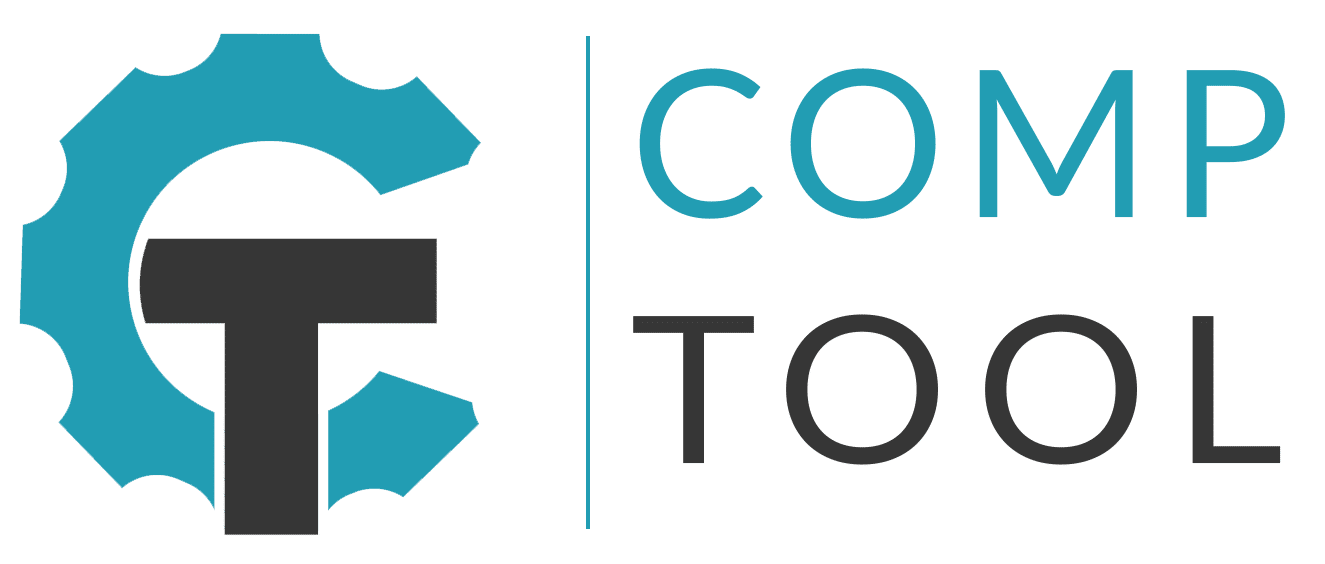Job Descriptions: Who Should Own Them?
Job descriptions are a critical component of any organization’s human resources strategy, serving as a core part of a career path for employees by outlining their roles, responsibilities, and expectations. While the roles that job descriptions play in an organization are clear, who ultimately owns them is not so clear.

In a poll that was run on LinkedIn that received nearly 1200 votes from Compensation and HR professionals, the results were mixed:
- 40% of respondents indicated that Compensation has ownership
- 35% indicated that HR has ownership
- 13% of respondents said that Talent Acquisition is responsible
- 12% suggest that everyone has ownership
The mixed bag of answers is not surprising given the collaborative nature of how job descriptions are created. While the managers and employees may be responsible for their initial development, other stakeholders are involved as well.
Though the development of JDs is a collaborative process requiring input from multiple stakeholders, including management, employees, and HR professionals, ownership must be assigned to one function. When ownership and responsibility are not clear, there is a risk of inconsistency and confusion, which can lead to attrition, lack of career pathing, disputes, and even legal risks.
Stakeholders Involved in Developing Job Descriptions
So, how do we decide what team owns job descriptions, a thankless task that most consider both arduous and boring? While this responsibility will vary for each organization, there are several stakeholders that should be considered when determining ownership.
Employees
Employees are critical stakeholders in the development of job descriptions and can provide valuable input on essential functions. Employees can help identify areas that may require additional skills or resources. While employees may be considered as part of the process to write descriptions, they are not the best owners. Employees lack the expertise to ensure compliance with local and state laws, lack visibility to ensure consistency across the Organization and have a tendency to inflate the job’s responsibilities.
Management
Managers are another essential stakeholder to consider. While management is generally one of the best stakeholders to include in the writing and updating of job descriptions, managers may lack the visibility or expertise required to ensure legal compliance and consistency across the organization.
HR Business Partners or Generalists
HR Business Partners are usually involved in the process, working with management to develop job descriptions that are legally compliant, consistent, and accurate. HR professionals can also work with managers to identify essential functions, knowledge, and skills required for each position and should have expertise in job leveling and career pathing.
Compensation
Compensation professionals are responsible for ensuring that employees are fairly compensated for their roles and responsibilities and are usually one of the last steps in the job description review process. Compensation professionals review job descriptions to ensure that they clearly outline employees’ responsibilities, knowledge, and skills required for each role. As such, Compensation is frequently the owner of job descriptions.
Talent Acquisition
Talent Acquisition work across all parts of the business to ensure that the business is able to recruit the best candidates. Talent Acquisition relies on accurate and up-to-date job descriptions to ensure that they are recruiting candidates with the right skills and experience for each role. However, Talent Acquisition is usually responsible for working with hiring managers to develop position descriptions, which are different from job descriptions. Due to the difference between position descriptions and job descriptions, Talent Acquisition is usually not the most suitable owner.
Deciding Who Owns Job Descriptions
Similar to museum curators who are responsible for managing collections of creations, but without the responsibility for creating them, Compensation teams often make the best choice to own descriptions for the following reasons.
- Have global visibility to the full job library
- Hold a firm understanding of job levels used by the organization
- Are able to navigate legal compliance issues
- Provide an objective opinion on the descriptions
- Usually have access to update and manage the jobs within the HRIS
- Have access to market data to determine pay bands
Ultimately, the decision should be based on what works best for each Organization. However, in this Author’s many years of experience managing compensation programs for a variety of Companies, the role best suited for this task is usually the Compensation Team.
CompTool Can Help
If you’d like to see how CompTool can help your team manage the job descriptions process, schedule a demo:



No responses yet